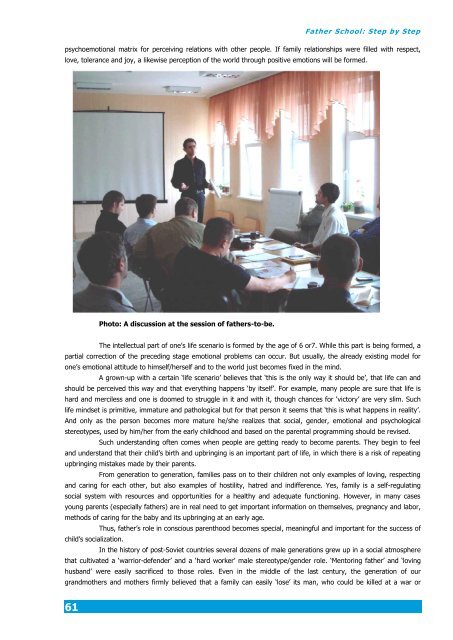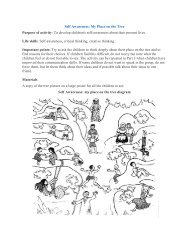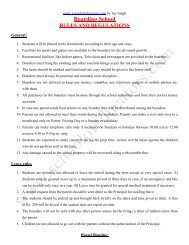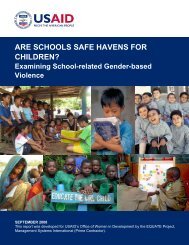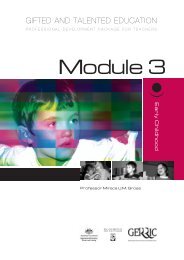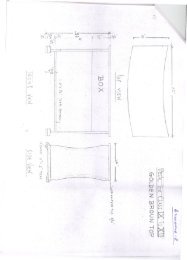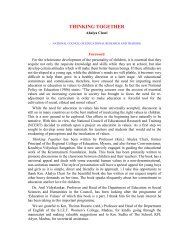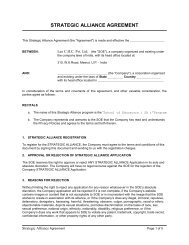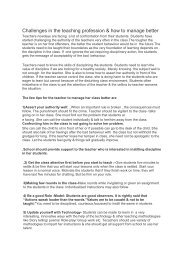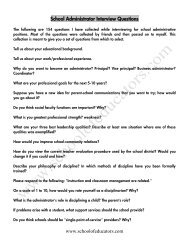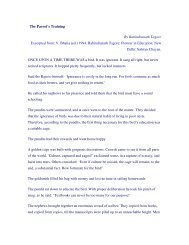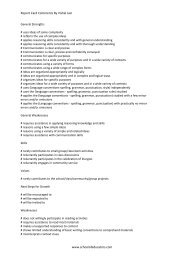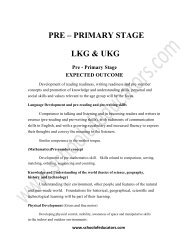Father <strong>School</strong>: S tep by Steptwo mistakes, i.e., an emotional withdrawal and a parental authoritarianism. These mistakes cause distortions in thedevelopment <strong>of</strong> a balanced personality; such children learn to defend their egoistic personal interests and ignoresocial interests, norms and rules.The influence <strong>of</strong> fathers onto early children development is scientifically proven. Many studies had shown thatfathers who held their babies right after the birth keep playing with them more <strong>of</strong>ten afterwards and spend moretime together as they grow. It was also established that babies <strong>of</strong> close and active fathers achieved higher scores inmental and motor development; they also grow to be more socially sensitive. Another important discovery concernedconjugal relations which were found to be significantly more harmonious, pursued shared objectives and plans, andexhibited a low proneness to conflicts.A distinguished scientist Grace J. Craig noticed that fathers who established strong emotional bonds with theirinfants had a higher sensitivity to the changing interests and needs <strong>of</strong> their growing children. These dads exert moreinfluence on their <strong>of</strong>fsprings who willingly listen to and want to imitate their fathers thanks to intimate relationsbased on trust. Developmental crises are less pronounced in such children and less painful for their family andsociety.A direct positive influence on a young child by a caring farther is usually accompanied by an indirect beneficialimpact on the baby and the family. Multiple studies have shown the importance <strong>of</strong> father’s support to his spouseduring and after her pregnancy in establishing positive relations in the whole family. In the triangle <strong>of</strong> family contacts(mother – father – child) mother primarily has a direct impact. However, fathers influence both directly and indirectly(through mothers).At babyhood every child through his family forms a so called ‘base’ stand in life. Eric Bern suggested that, at anearly infantile stage <strong>of</strong> forming a life scenario, all babies already have certain notions about themselves andsurrounding people, especially parents. These notions appear to stay with us for the whole life and may becharacterized in the following way: ‘I am OK’’ or ‘I am not OK’; ‘you are OK’ or ‘you are not ОК’.If these assumptions are combined in all possible variants, we receive four attitudes about ourselves and otherpeople:1. I am ОК, you are ОК;2. I am not ОК, you are ОК;3. I am ОК, you are not ОК;4. I am not ОК, you are not ОК.The first base stand in life is healthy and productive, while the remaining three contain considerable risksfor the future wellbeing <strong>of</strong> a little person. Most parents wish their children happiness, joy and success. But where doso many unsuccessful and unhappy people come from? From the childhood.From our childhood we bring psychological ‘images’ <strong>of</strong> our parents just as we remembered them beforethe age <strong>of</strong> three. Infant or young child perception is completely different from adult perception. However, manygrown ups, especially young and inexperienced parents, have no idea about this.A baby has an integrated perception <strong>of</strong> the world. He has no clear idea about time and space andconsiders everything around to be a ‘part’ <strong>of</strong> him.A baby considers his mother's skin and breast, father’s hair and hands, bed sheet, its rattle and light froma desk lamp a ‘part’ <strong>of</strong> himself. Only after three months <strong>of</strong> age he starts to distinguish between himself and hisenvironment and forms the idea <strong>of</strong> ‘This is Me, this is not Me’.Feeling comfort or discomfort for this little person is just as comprehensive. Stomachache, loneliness,hunger and other problems, with which adults would easily cope, for the baby are similar to ‘near death’. That is whya union <strong>of</strong> father and mother who love each other and their child is the best starting base for forming the ‘I am OK,You are OK’ stand <strong>of</strong> life.Not so many young (as well as mature) families can boast about having achieved harmoniousrelationships. Not all new parents are confident in their parental abilities and have reached such a level <strong>of</strong> personalpsychological maturity that would guarantee a happy life scenario to their child.The emotional part <strong>of</strong> one’s life scenario which is based on the nonverbal sensory perception is acquiredby children before the age <strong>of</strong> three years. By this time, a child has already been ‘trained’ which emotions are ‘moreconvenient’ and more customary to perceive the surrounding world. And if family relationships were mainly based onreproaches, <strong>of</strong>fences, anger, irritation and other negative emotions, the child will automatically develop the same60
Father <strong>School</strong>: S tep by Steppsychoemotional matrix for perceiving relations with other people. If family relationships were filled with respect,love, tolerance and joy, a likewise perception <strong>of</strong> the world through positive emotions will be formed.Photo: A discussion at the session <strong>of</strong> fathers-to-be.The intellectual part <strong>of</strong> one’s life scenario is formed by the age <strong>of</strong> 6 or7. While this part is being formed, apartial correction <strong>of</strong> the preceding stage emotional problems can occur. But usually, the already existing model forone’s emotional attitude to himself/herself and to the world just becomes fixed in the mind.A grown-up with a certain ‘life scenario’ believes that ‘this is the only way it should be’, that life can andshould be perceived this way and that everything happens ‘by itself’. For example, many people are sure that life ishard and merciless and one is doomed to struggle in it and with it, though chances for ‘victory’ are very slim. Suchlife mindset is primitive, immature and pathological but for that person it seems that ‘this is what happens in reality’.And only as the person becomes more mature he/she realizes that social, gender, emotional and psychologicalstereotypes, used by him/her from the early childhood and based on the parental programming should be revised.Such understanding <strong>of</strong>ten comes when people are getting ready to become parents. They begin to feeland understand that their child’s birth and upbringing is an important part <strong>of</strong> life, in which there is a risk <strong>of</strong> repeatingupbringing mistakes made by their parents.From generation to generation, families pass on to their children not only examples <strong>of</strong> loving, respectingand caring for each other, but also examples <strong>of</strong> hostility, hatred and indifference. Yes, family is a self-regulatingsocial system with resources and opportunities for a healthy and adequate functioning. However, in many casesyoung parents (especially fathers) are in real need to get important information on themselves, pregnancy and labor,methods <strong>of</strong> caring for the baby and its upbringing at an early age.Thus, father’s role in conscious parenthood becomes special, meaningful and important for the success <strong>of</strong>child’s socialization.In the history <strong>of</strong> post-Soviet countries several dozens <strong>of</strong> male generations grew up in a social atmospherethat cultivated a ‘warrior-defender’ and a ‘hard worker’ male stereotype/gender role. ‘Mentoring father’ and ‘lovinghusband’ were easily sacrificed to those roles. Even in the middle <strong>of</strong> the last century, the generation <strong>of</strong> ourgrandmothers and mothers firmly believed that a family can easily ‘lose’ its man, who could be killed at a war or61


